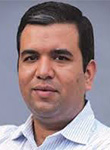For a healthier you, let your smartphone call it in
By Blaine Friedlander




The National Science Foundation (NSF) has awarded a five-year, $3 million grant to a multidisciplinary group of Cornell researchers who are developing a device to help you track your physical well-being right in the palm of your hand.
By integrating today’s nanofabricated “lab-on-a-chip” technology with smartphones, the resulting devices can test blood or saliva to transform into an all-inclusive monitoring machine, potentially eliminating the need for some one-task medical appliances.
“This research project could alter the domestic health care landscape by enabling earlier-stage detection of disease, reducing the cost of public health care delivery and allowing individuals to take better control of their own well-being,” said David Erickson, professor of mechanical and aerospace engineering, who serves as the grant’s principal investigator.
The project brings together several Cornell departments and disciplines. In addition to Erickson, other collaborators are Deborah Estrin, professor of computer science at Cornell Tech and professor of public health at Weill Cornell Medical College; Tanzeem Choudhury, associate professor of information science in Computing and Information Science; and Saurabh Mehta, assistant professor of global health, epidemiology and nutrition in the College of Human Ecology. Also joining the team are Aydogan Ozcan of UCLA and Katie Shilton of University of Maryland.
The NSF funding will inaugurate the Public Health, Nanotechnology and Mobility program, or PHeNoM, with a focus on deploying “lab-on-chip” devices to concurrently take advantage of smartphone technology. The award comes from the Integrated NSF Support Promoting Interdisciplinary Research and Education program, or INSPIRE.
With the new grant, the researchers are developing three specific smartphone applications for nutrition, blood and stress. In addition to the applications, the researchers are creating a small device that fits over the smartphone’s powerful megapixel camera, which becomes a powerful detection device that can analyze small blood samples from test strips.
In developing a Nutri-Phone system, consumers may test easily for cholesterol, vitamin B12 and vitamin D levels, and then compare results with well-defined healthy ranges.
Along with the Nutri-Phone system, the scientists look to develop Hema-Phone diagnostic tools for patients with blood conditions.
The Stress-Phone can detect levels of stress through voice and physiological assays.
Cornell’s Atkinson Center for a Sustainable Future earlier provided academic venture funding for two related projects by Erickson and Mehta: a smartphone app that tests for cholesterol and an app that analyzes micronutrient deficiencies for world populations.
Media Contact
Get Cornell news delivered right to your inbox.
Subscribe